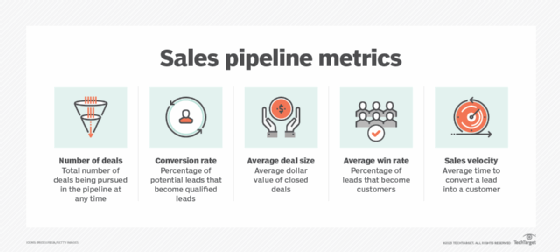
Olivier Le Moal - stock.adobe.co
10 sales enablement best practices
A proper sales enablement strategy can help businesses improve revenue, training for sales teams and overall CX. And, with the right tools, teams can become more efficient.
Most organizations look to sales leaders to drive initiatives that support revenue growth, which requires them to adopt and implement certain best practices.
Sales leaders must consider various strategies, like hiring the right team members, implementing effective processes and adopting the appropriate tools. If they follow sales enablement best practices, they can empower sales representatives, meet and exceed targets, and build strong customer loyalty. They can also equip the sales team with tools that can bring tangible, measurable and effective results.
Explore 10 sales enablement best practices to consider when outlining a sales strategy.
1. Focus on customers' needs
Sales reps should always prioritize customers' needs, even amid the pressure of quotas and targets. They should avoid sales practices that focus solely on closing deals at any cost, as this approach can make customers feel unheard.
Solving customer pain points, even if a sales rep has to delay a sale or offer a lower-tier product, can foster loyalty and trust because customers know the organization will prioritize them.
2. Understand the customer base
Customers play a central role in whether a deal is won or lost. If the organization does not have a well-defined, ideal customer profile and target buyer personas, then it can lose major deals.
Sales and marketing leaders who clearly plan and define their teams' strategies and consider who they target can enable more consistent results.
3. Have empathy toward customers' problems
For sales reps to understand customers' pain points and build a rapport with them, they should have a high emotional intelligence. This can be natural for some but can be learned by others.
Sales leaders should ensure their team members have the right communication style, personality and emotional intelligence to put the customer at ease and be a good listener. While this can apply for sales reps, it can also apply to customer service agents who answer customers' questions online or over the phone.
4. Adopt sales technology tools
While some sales reps may dread sitting in front of a computer to enter their opportunities and activities, data is critical to support any sales strategy. For example, entering data into a CRM system offers insights into what's in the pipeline and can help sales reps maintain appropriate goals and reminders for communications with their customers. These tools can also help sales leaders see an account's history and gain insights into what opportunities are won or lost and why.
5. Create well-defined procedures and processes
Sales leaders should establish standard operating procedures to avoid pitfalls, such as incorrect quotes and missed follow-ups. Sales playbooks are also valuable resources to support new representatives and address common objections.
6. Assess metrics and analytics
Sales leaders can manage their teams by analyzing sales data. This information often presents leading and lagging indicators that can predict if a low number of calls or customer interactions will result in lower closing rates.
Additionally, sales leaders should look at several KPIs to measure the success of their teams beyond the dollar amounts. This practice can identify areas of improvement and insights into which sales reps perform well and which may need additional coaching.

7. Gain support across the business
Sales teams require support to become as successful as possible. Other departments, like customer service or product delivery, support the overall sales strategy and sales team as well. With full business support, sales reps can ensure overall CX is positive and any deliverables they need from other departments aren't lower priority.
8. Continuously train and mentor sales teams
Sales training should be an ongoing process for any organization. Whether they train on product offerings, effective communication or current market trends, sales teams must always fine-tune and enhance their skills to stay relevant and provide up-to-date information to customers.
9. Use technology to automate and innovate
While traditional CRM tools can help with sales opportunities, activities and reminders, more powerful tools can support sales enablement and growth for any company. Those include the following:
- Lead generation tools.
- Bots that can capture customer data from a website 24/7.
- AI that can respond with customized email responses to inquiries.
- A simple automation or workflow that can generate reminders and insights for the next time a sales rep should follow up with a customer.
10. Measure the strategy's success
Markets constantly change, so sales leaders must periodically reassess their strategies and adjust based on findings, results and feedback.
As businesses evolve, sales leaders must continuously adapt and refine their approaches. By adopting the right sales enablement best practices, leaders can shape a winning formula to drive revenue growth and empower their teams to tackle ongoing challenges.






